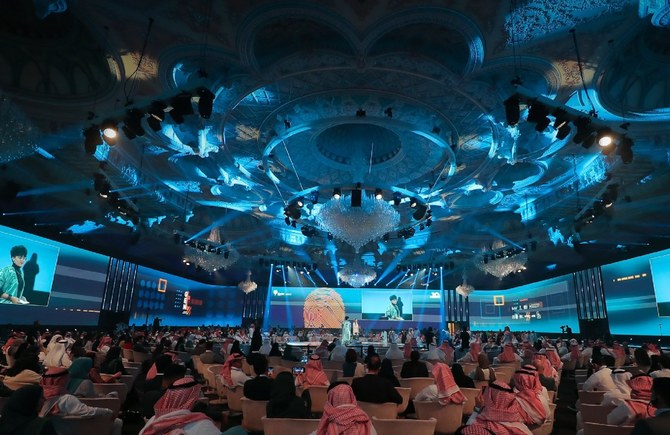RIYADH: The two-day Misk Global Forum here saw some of the world’s leading intellectuals, officials, academics, influencers, sports people and artists gather to discuss how to boost the knowledge economy by bridging the gap between young and older people, developing new leaders and empowering communities.
The MGF, the flagship global platform of the Misk Foundation, established in 2016, has extended Misk’s mission to young people across the globe through international events, research and global initiatives. The forum ran from Nov. 9 to 10.
The event “brings together emerging and established leaders, innovators, and creators to explore, experience and experiment with ways to meet the challenge of change,” according to the forum’s website.
Hosted at King Abdulaziz International Conference Center in Riyadh, the forum began on Wednesday with the theme of “Multigenerational dialogue to break barriers and inspire change.”
One of the most well-attended sessions of the first day was titled “Generations of the Future,” which featured a conversation between Prince Abdulaziz bin Salman, the Saudi minister of energy, and Omar Al-Jeraisy, the founder of the Socrates podcast. The two discussed ways to enable and empower young people to build society.
“To empower the youth, you have to enable an economic environment that gives them ownership,” said Prince Abdulaziz.
“Change is a journey, not a destination. It cannot be achieved unless there is a leadership that enables youth,” Al-Jeraisy said.
Another discussion on day one was led by Shamim Nabuuma Kaliisa, the co-founder and CEO of Chill Food Center, who focused on ways to leverage intergenerational dialogue to raise awareness and destigmatize mental health.
She stressed the importance of these conversations during a UN Sustainable Development Goals circle discussion titled “Good Health and Wellbeing.”
“I am speaking about mental health and how the young and older generations can work together to create solutions that we can come up with for depression and anxiety. We discussed the idea of implementing a platform for the younger and older generation(s) to collaborate on finding new ways of addressing mental health,” Kaliisa told Arab News.
“These conversations are very important because if you are depressed, it is going to affect what you are going to do,” she added.
Intellectual and influencer Jay Shetty hosted a session focusing on how millennials and Gen Z can create and implement a unique purpose in the world. He then answered several questions from the audience on what it means to have success, how to handle pressure, and develop satisfaction and happiness in the workplace and in personal life.
“A lot of people think their profession has to be their purpose and the truth is that not every single hobby or purpose or passion can be turned into a career,” Shetty said.
“So if you are someone who has to go to work every day to make money and to pay the bills to take care of your family and you use your spare time in the evenings and the weekends to do what you’re passionate about, that’s a beautiful balance,” he added.
In the afternoon, Palestinian American standup comedian, Mo Amer, took to the stage in a fireside chat to discuss his journey, the power of comedy, and the importance of staying grounded while looking into the future.
“It’s important to understand your art form and tip the hat to those before you. Otherwise, all that hard work of the generations before you is lost. We have to keep the connection to the past alive,” Amer said.
The cities of the future were discussed in a session led by Alaa Al-Ban, chair of the interior design department and assistant professor at Dar Al-Hekma University, featuring Jerry Inzerillo, CEO of Diriyah Gate Development Authority, and David Henry, CEO of Prince Mohammed Bin Salman Nonprofit City.
“The cities of the future are generally expansions of existing cities. Proximity, living, and employment are what is important for the cities of the future,” Henry said.
In a session titled “We are Family,” Maha Al-Juffali, director and acting trustee at the Help Center, Daniah Ghandour, board member at the Help Center, and Marilyn Zakhour, CEO of Cosmic Centaurs, discussed philanthropy in Saudi Arabia. They also touched on the importance of family as an anchor to uphold intergenerational values, and address societal changes and transformations.
The second day of the forum saw participants discuss an array of topics including podcasting, e-sports broadcasting, intercultural communication, and innovation skills.




























